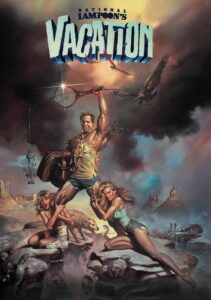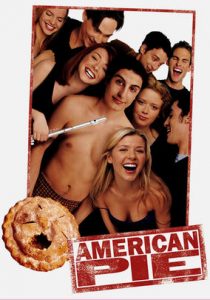National Lampoon’s Vacation-1983
Director Harold Ramis
Starring Chevy Chase, Beverly D’Angelo
Scott’s Review #1,300
Reviewed September 19, 2022
Grade: A-
The film that spawned a slew of sequels, remakes, spoofs, and other things, National Lampoon’s Vacation (1983) had more influence on 1980s movies than it probably should have.
The slapstick road trip became overused familiar territory, a situation comedy rife with silly scenarios and possibilities.
Despite having started it all, my favorite National Lampoon will always be the Christmas Vacation installment from 1989 but for some snickers, hoots, and belly laughs, Vacation is fresh and authentic. holding up well in the nostalgia category.
So what if Chevy Chase was a douchebag in real life? His portrayal of Clark Griswold is his finest achievement and is firmly placed in the annals of slapstick comedy’s greatest characters. Endless quotes and impersonations of the bumbling dad have emerged over the years.
Great fun is looking for other comedy actors like Eugene Levy and John Candy who later would forge their path into comedy legend.
Accompanied by their children Audrey and Rusty, played by Dana Barron and Anthony Michael Hall, Clark Griswold (Chase) and his wife, Ellen (Beverly D’Angelo), decide to drive instead of fly from Illinois to a California amusement park named Walley World to enjoy a much-needed summer break.
Clark is convinced that some togetherness is just what the family needs.
As Clark increasingly fixates on a mysterious, sexy woman (the acting debut of Christie Brinkley) driving a red sports car, the Griswolds deal with car problems and the death of a family member, Aunt Edna (Imogene Coca) as they face hi-jinks on the way to their vacation.
Exhausted, they finally reach Los Angeles, but, when Clark worries that the trip is being derailed again, he acts impulsively to get his family to the park.
National Lampoon’s Vacation is a rarity in screwball comedy where almost all of the setups and gimmicks work. Typically, the situations feel stale and tried and true but there is an authenticity brimming over its cup, and that’s largely thanks to Chase.
Don’t get me wrong. The film is hardly worthy of study in film school and the script is polished and patterned out but like other screwball comedies I love like Caddyshack (1980) and Clue (1985), it’s got something solid.
I think it’s because the characters are very relatable. Who doesn’t have a wacky Aunt Edna or a Cousin Eddie (Randy Quaid) somewhere in their family tree?
Long-suffering, suburban housewife Mom Ellen has a heart of gold and represents the classic 1970s or 1980s homemaker with a glimmer of progressiveness.
She dutifully scrambles eggs for breakfast and shops for cereal and dog food but also keeps Clark at bay before he does something ridiculous.
Chase and D’Angelo have tremendous chemistry bouncing one-liners off each other as naturally as a real-life conversation so that we buy them as husband and wife.
What kid who grew up in this period can’t relate to the horrid paneled oversized station wagon that ran rampant in suburbia? I sure remember those gas guzzlers eventually replaced by the minivan.
It’s perfection to see that style of car represented in this film as it adds to the hilarity and is a character in itself.
The fun continues because the Griswolds embark on travel across the United States. So, the film provides a slice of Americana and harkens back to a time when if you were an American you were united and bonded even if you had differences.
What National Lampoon’s Vacation (1983) does so well watching in modern times is remind us what that felt like. An adventure across the good ‘ole USA was not such a bad thing and the folks you met along the way were friendly and warm without suspicion.
The film is like a dear old friend who has emerged from the woodwork, dusty, but still full of life.


